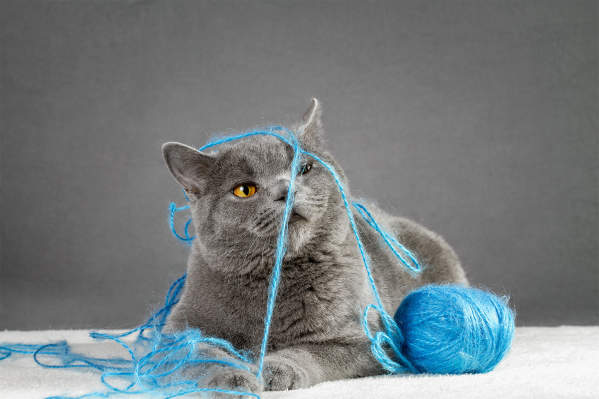As a cat parent, there are few things as anxiety-inducing as figuring out that your feline friend accidentally consumed a product that they were not supposed to. If your cat ate string, thread, or ribbon, you have reason to be particularly concerned about their stomach and intestines, potential obstructions, and the fact that they might even need to get surgery to have it removed.
If your cat ate string, it's important to understand the safety concerns, signs of ingestion, and problems associated with cats ingesting thin and long objects.
Note: We will refer to all thin, long objects like string, thread, cords, plant material, or ribbon simply as “string” in this article.
Safety concerns if your cat ate string
Unfortunately, it's not safe for your cat to play with string—no matter how much they might enjoy doing so. There are a myriad of other safe, fun activities that your cat can engage in, but sadly, playing with string is not one of them. This is especially relevant if your cat has consumed string in the past. But, even if they have not, it's better not to take a chance that they potentially will.
Instead, you should remove the string from your cat’s access and replace this with a safer toy. As always, if you have any questions about if a toy is safe for your cat to use, you can reach out to your veterinarian or a Pawp professional.
Why are string, thread, and ribbon dangerous to cats?
When a cat ingests a piece of string, it has a high risk of causing your cat to choke or create an obstruction in your cat’s body. When trying to swallow a piece of string, a cat may realize it isn’t something they want to eat, but the spines on their tongue hold the string in their mouth and can cause them to reluctantly swallow it.
As the string is being swallowed, it can become wrapped around the tongue, throat, or in the stomach. Every time the cat swallows, the string is pulled down into the digestive tract and creates a “sawing” motion. This can cause severe damage to the tissues, cause the intestines to bunch up, and penetrate into other organs.
This type of blockage is defined as a linear foreign body obstruction. An exploratory laparotomy is performed to locate the obstruction, and if possible, remove the linear foreign body. If there are sections of damaged intestines, they can be removed if the surrounding tissues are still healthy. In some cases, the damage and infection is too severe to be repaired.
Are different types of string more dangerous than others?
While all types of string have the potential to cause problems for your cat and should therefore be avoided, yes, there are some types of string that are more hazardous than others.
Not only does the classic string (cotton string, twine, etc.) represent a problem, but human hair or sewing thread does as well. The thinner the string, the more dangerous it is. Thinner strings can act as a saw faster than their thicker counterparts.
That isn’t to say that a thicker piece of string is not hazardous. If your cat consumed a thick piece of string, they still are not out of the woods. The string could still turn into a linear foreign body and create problems.
That’s why you should monitor their symptoms and reach out to a veterinarian to learn more about the appropriate next steps.
Signs your cat ate string
If you notice of the following signs, it could indicate that your cat ate string.
Gagging
Choking
Pawing at the mouth
Drooling
Repeated vomiting
Diarrhea with or without straining
Vomit or diarrhea with string pieces
Abdominal pain
Lethargy
Fever
Not eating and/or drinking
When to seek veterinary intervention
The first thing that you should do if your cat ate string is to try to remain calm. If you get to a veterinarian soon, you'll likely be able to help your cat make a full recovery. If your cat ate string, it's extremely wise for you to act quickly. In situations where your cat is injured or ill, having time on your side is best.
If you're not sure if your cat ate a piece of string but you see evidence that a string has been played with, chewed, or you are seeing any of the signs listed above, a Pawp professional can help guide you on next steps to take. Be sure not to induce vomiting at home or try to pull the string out of their mouth or rectum. This may cause a serious injury.
How do I get my cat to stop eating string?
The best way to get your cat to stop eating string is to ensure that it's not accessible for them. If you are a knitter, sewer, or crafter, be sure that you put all of your supplies away and never leave anything unoccupied. If your cat is eating string from clothing, put it away so that they are unable to reach it.
When it comes to making sure that your cat stops eating this product, an ounce of prevention truly is worth a pound of cure. Being more diligent about where you store your string is an excellent way to increase the odds you won’t have a repeat situation occur.

Reviewed and fact-checked by
Mika, RVT at Pawp
